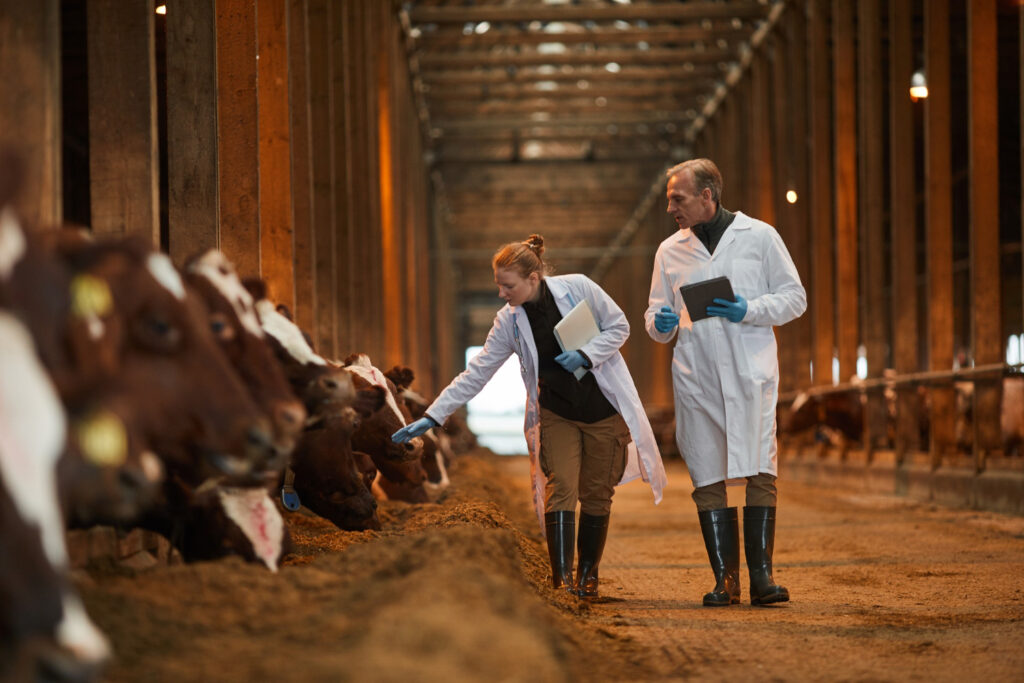Advances in veterinary biotechnology and its solutions for the sector

Profesionales veterinarios aplican técnicas de biotecnología para optimizar la salud y productividad del ganado.
Veterinary biotechnology has established itself as one of the most innovative disciplines in the scientific field, transforming animal care, veterinary medicine, and agricultural production. Thanks to scientific advances, professionals in the sector can now offer more effective solutions to improve animal health and productivity. From the creation of transgenic animals to the application of new techniques for protein production, veterinary biotechnology is redefining the limits of what is possible in this field.
Veterinary biotechnology is in a stage of rapid evolution, with a multidisciplinary approach that includes areas such as genetics, microbiology, and genetic engineering. This branch of biotechnology applies the principles of biomedicine and engineering to improve animal traits and optimize production. Since its first concept in 1919 by engineer Karl Ereki, veterinary biotechnology has advanced considerably, allowing for more precise control of animal health and, consequently, food production.
In its early stages, efforts focused on manipulating bacteria and fungi, but in recent decades it has extended to working with animals, genetically modifying various species to obtain specific benefits. Through genetic modification, animals can be designed to resist diseases, grow faster, and produce more resources such as human proteins. These advances have allowed veterinary biotechnology not only to optimize livestock production but also to contribute significantly to medicine and science.
Recent advances in veterinary biotechnology and their applications
The most significant advances in veterinary biotechnology began to take shape in the 1980s with the creation of transgenic animals. These animals have a modified gene that allows them to develop improved traits that could not have been achieved conventionally. Among the main achievements these advances have brought are:
Faster growth rate: The development of animals with a faster growth rate has made it possible to increase production in less time, benefiting both farmers and the food industry.
Disease resistance: Biotechnology has made it possible to create animals more resistant to certain diseases, reducing the use of antibiotics and improving animal health.
Higher protein production: Thanks to genetic modification, some animals can produce more human proteins in products such as milk and eggs, opening new possibilities for medicine and pharmaceutical biotechnology.
These advances have also enabled the development of medicines with specific enzymes, improving the treatment of various diseases. The health sector has seen a remarkable improvement in the production of useful antibodies and enzymes, contributing to better quality of life for animals and, in some cases, benefiting human medicine.
Future perspectives and the social impact of veterinary biotechnology
The field of veterinary biotechnology continues to expand, with new perspectives that could forever change veterinary medicine and livestock production. One of the most promising applications is the possibility of using genetically modified animals to create organs for human transplants. This could be achieved by modifying the genes of animals such as pigs so their organs are compatible with humans, potentially solving the shortage of available organs for transplant.
Cloning is another area advancing rapidly in veterinary biotechnology. With the growing global demand for livestock products, cloning techniques could help increase production more efficiently without sacrificing quality. Advances in assisted reproduction, along with cutting-edge genetic techniques, are revolutionizing the livestock industry.
However, these advances also raise important ethical questions. The genetic manipulation of animals and their possible use in human medicine open debates about scientific and social ethics. The scientific community and society must find a balance between the advances biotechnology can offer and the ethical standards that should govern its implementation. As biotechnological solutions continue to evolve, new regulations will likely be needed to ensure that the benefits are applied responsibly and sustainably.








